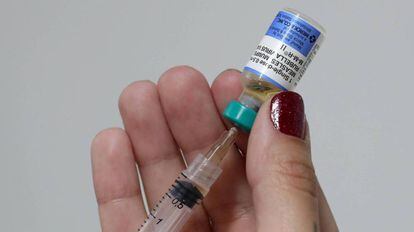A doctor prepares an injection against measles. Fernando Bizerra (efe)
Europe was declared a polio-free region in 2002. At the time, it seemed almost irreversible in a world determined to eradicate the disease, as it has already done with smallpox.
But in these two decades history has not been as successful as some predicted.
The virus refuses to disappear: it continues to be present in the three endemic countries (Afghanistan, Pakistan and Nigeria), and wastewater from the United Kingdom and the United States shows that it has circulated through these countries.
The risk is there, and the vaccination levels of the European Union may not be sufficient to guarantee the absence of outbreaks, as the European Center for Disease Control (ECDC) has alerted this week.
"As long as there are population groups that are not vaccinated in European countries and polio is not eradicated in the world, the risk of the virus being reintroduced into Europe will remain," said the director of the agency, Andrea Ammon, in a statement on Monday. release.
“In addition, in the case of measles, which is highly transmissible, the virus can spread in pockets of unprotected populations when coverage is not optimal.
This can lead to outbreaks that can create a burden on health systems, even in countries that have eliminated it,” she added.
The incidence of this last disease has fallen radically in recent years.
It had a worrying rise until 2018, but since then, until 2022, it has fallen by 99%, according to the latest ECDC measles report, published this Monday.
This good news, warns the organization, should not serve to distract the health authorities from the potential problem: “Probably, it was due to the prevention measures deployed to stop the covid.
But, given the suboptimal levels of vaccination coverage in several countries, it is likely that we will see increases in the number of reported cases in the EU in the future."
Coverage is very uneven depending on the country for both diseases: measles and polio.
In the case of the latter, although 23 of the 29 states studied have coverage greater than 90%, the ECDC estimates that 2.4 million children between 12 and 24 months of age had not received the full three-dose regimen between 2012 and 2021. “Unvaccinated cohorts have accumulated over time and continue to be at risk of infection.
Unimmunized people may represent potential risks of localized outbreaks of paralytic poliomyelitis in case of importation of the virus or a generalized silent circulation in the population”, the report states.
The countries with the highest percentage of the population without the three doses are Romania (11.7%), Austria (10.7%), Iceland (8.9%), Poland (8.5%), Germany (8.3% ), Bulgaria (8.2%).
The most vaccinated populations are those of Hungary (with only 1% of the population without the complete regimen), Belgium (1.6%), Malta (1.9), Sweden (2.4%), Cyprus (2 .7%), France and Slovakia (3.1%).
Spain, with 4.4%, is somewhat below the average: 5.5%.
This illustrates that vaccination is not directly correlated with the standard of living or the wealth of countries;
there are more factors at play, such as the penetration of anti-vaccine movements, which often permeate among the highest socioeconomic levels.
Drop in vaccinations
Regarding measles, the report indicates that 93% of the European population has one dose and 89% both.
During the pandemic, immunization rates have fallen in 15 countries, including Spain, which is slightly above the continent's average (89.4%), with 91% of the population having two injections.
Only five countries (Hungary, Norway, Poland, Portugal and Slovakia) exceed 95% of the complete guideline.
"Measles affects all age groups, but that of children under one year of age is the one with the highest incidence," the document reads.
“Generally, they are too young to receive the vaccine, and should therefore be protected by herd immunity.
In 2022, 80% of the 127 reported cases occurred between one and four years of age in unvaccinated children”, he continues.
These drops in vaccinations can be explained in part because confidence in them has dropped during the pandemic, according to a recent Unicef survey.
"This decrease in trust is present in 52 of the 55 countries analyzed and in the Spanish case it is almost eight points, to reach 88.6%, which is still a high rate, but it is a worrisome phenomenon", warned this Thursday in Madrid José María Vera, executive director of Unicef Spain at the presentation of the report
State of the World's Children.
All these data are "worrying", in the opinion of Jaime Jesús Pérez, president of the Spanish Vaccinology Association.
“We are making an effort to be above 95% in vaccination, which is what is necessary to achieve herd immunity.
If this downward trend continues, it is very likely that we will see measles outbreaks,” Pérez points out.
He puts the metaphor of the canary in the mine: it is a very contagious disease and when it begins to be detected, it is a sign that vaccinations are going astray.
“To see cases of polio it would take more time and worse vaccination rates, but it would be even more worrisome, because it is a very serious disease,” he warns.
ECDC has used the European Vaccination Week, which is now taking place, to raise awareness about its importance.
“Continued efforts are essential to identify immunity gaps in people of all ages, including those who may have missed or delayed vaccination, especially in hard-to-reach populations such as refugees, migrants, asylum seekers, and other vulnerable and underserved populations. .
It is necessary to accelerate efforts to improve immunization campaigns and promote acceptance and acceptance of vaccines to achieve and maintain high vaccination coverage against vaccine-preventable diseases.
Subscribe to continue reading
Read without limits
Keep reading
I'm already a subscriber

